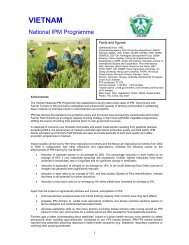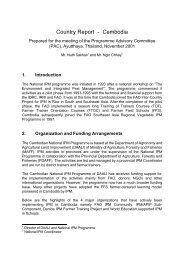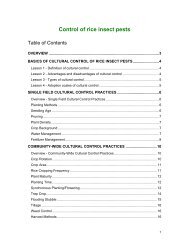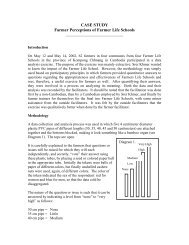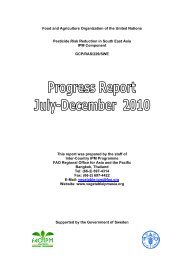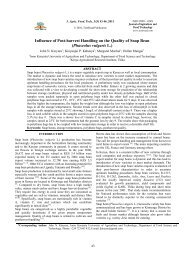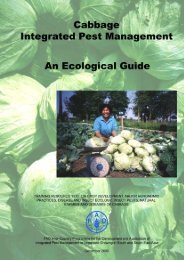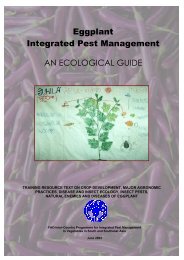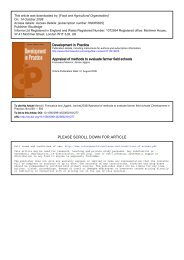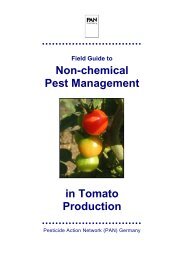Report of the Bi-Annual Meeting FAO Vegetable IPM Programme in ...
Report of the Bi-Annual Meeting FAO Vegetable IPM Programme in ...
Report of the Bi-Annual Meeting FAO Vegetable IPM Programme in ...
You also want an ePaper? Increase the reach of your titles
YUMPU automatically turns print PDFs into web optimized ePapers that Google loves.
<strong>Report</strong> <strong>of</strong> <strong>the</strong> <strong>Bi</strong>-<strong>Annual</strong> <strong>Meet<strong>in</strong>g</strong><br />
<strong>FAO</strong> <strong>Vegetable</strong> <strong>IPM</strong> <strong>Programme</strong> <strong>in</strong> Asia<br />
Haiphong, Vietnam<br />
23-25 April 2007<br />
1. INTRODUCTION<br />
S<strong>in</strong>ce <strong>the</strong> beg<strong>in</strong>n<strong>in</strong>g <strong>of</strong> phase II <strong>in</strong> 2002, <strong>the</strong> <strong>FAO</strong> Regional <strong>Vegetable</strong> <strong>IPM</strong> <strong>Programme</strong><br />
has organized a meet<strong>in</strong>g twice a year for representatives <strong>of</strong> <strong>the</strong> member countries,<br />
organizations <strong>in</strong>volved or l<strong>in</strong>ked to <strong>the</strong> programme activities and project staff. Each <strong>of</strong> <strong>the</strong><br />
member countries has been host<strong>in</strong>g <strong>the</strong> event on rotational basis. The objectives <strong>of</strong> <strong>the</strong><br />
recently-held meet<strong>in</strong>g <strong>in</strong> Hai Phong, Vietnam were as follows;<br />
1. To provide orientation and exchange experiences regard<strong>in</strong>g <strong>the</strong> ongo<strong>in</strong>g <strong>FAO</strong><br />
supported <strong>IPM</strong> work by National <strong>IPM</strong> <strong>Programme</strong>s <strong>in</strong> <strong>the</strong> Greater Mekong Sub-<br />
Region;<br />
2. To streng<strong>the</strong>n regional network<strong>in</strong>g among nationals, partner organization<br />
representatives and <strong>FAO</strong> staff <strong>in</strong>volved <strong>in</strong> implementation <strong>of</strong> <strong>the</strong> <strong>FAO</strong> Regional<br />
<strong>Programme</strong>;<br />
3. To discuss strategies for implementation <strong>of</strong> Community Education <strong>in</strong>itiatives <strong>of</strong><br />
<strong>the</strong> new GMS Pesticide Risk Reduction <strong>Programme</strong>.<br />
This time <strong>the</strong> meet<strong>in</strong>g was organized <strong>in</strong> Hai Phong, Nor<strong>the</strong>rn Vietnam, <strong>in</strong> collaboration<br />
between <strong>FAO</strong> staff and <strong>the</strong> Plant Protection Department <strong>of</strong> <strong>the</strong> M<strong>in</strong>istry <strong>of</strong> Agriculture<br />
and Rural Development.<br />
There were 36 participants who attended <strong>the</strong> meet<strong>in</strong>g <strong>in</strong>clud<strong>in</strong>g 12 representatives from<br />
country programmes (Cambodia, Ch<strong>in</strong>a, Laos, Thailand and Vietnam), 9 representatives<br />
from civil society organizations and NGOs (Field Alliance, Pesticide Action Network-<br />
Asia Pacific, Srer Khmer, CEDAC, PEAC, CDEA and Thai Education Foundation) and 5<br />
resource persons (representatives <strong>of</strong> <strong>the</strong> donors and <strong>Bi</strong><strong>of</strong>orsk/NIAER) <strong>in</strong> addition to <strong>FAO</strong><br />
staff. The schedule <strong>of</strong> <strong>the</strong> meet<strong>in</strong>g is attached <strong>in</strong> Annex 1 and <strong>the</strong> list <strong>of</strong> participants <strong>in</strong><br />
Annex 2.<br />
2. MAIN ACTIVITIES<br />
2.1 Open<strong>in</strong>g Remarks<br />
Mr. Dam Quoc Tru, Vice Director General <strong>of</strong> <strong>the</strong> Plant Protection Department (PPD),<br />
opened <strong>the</strong> meet<strong>in</strong>g. He expressed a concern regard<strong>in</strong>g <strong>the</strong> cont<strong>in</strong>uous misuse <strong>of</strong><br />
pesticides <strong>in</strong> crop cultivation throughout <strong>the</strong> region, and acknowledged <strong>FAO</strong>s<br />
accomplishments and cont<strong>in</strong>uous support to change this development through <strong>IPM</strong><br />
farmer education and policy support. On behalf <strong>of</strong> <strong>the</strong> Government <strong>of</strong> Vietnam, he<br />
welcomed all participants and wished <strong>the</strong>m success with <strong>the</strong> meet<strong>in</strong>g and future<br />
programme activities.
Follow<strong>in</strong>g <strong>the</strong>se open<strong>in</strong>g remarks, Mr. Jan Willem Ketelaar, <strong>the</strong> Chief Technical Adviser<br />
<strong>of</strong> <strong>the</strong> <strong>FAO</strong> Regional <strong>Vegetable</strong> <strong>IPM</strong> <strong>Programme</strong>, also welcomed <strong>the</strong> participants on<br />
behalf <strong>of</strong> <strong>FAO</strong> and gave an overview <strong>of</strong> <strong>the</strong> objectives and schedule <strong>of</strong> <strong>the</strong> meet<strong>in</strong>g.<br />
2.2 Presentations and discussion on country specific activities<br />
Each <strong>of</strong> <strong>the</strong> member countries gave a brief overview <strong>of</strong> <strong>the</strong>ir national <strong>IPM</strong> programmes<br />
and a presentation on specific activities, <strong>in</strong>novations or particular challenges as part <strong>of</strong> <strong>the</strong><br />
exchange shar<strong>in</strong>g <strong>of</strong> experiences. The special topics presented by country were <strong>the</strong><br />
follow<strong>in</strong>g:<br />
1. Cambodia (presented by Mr. Ngh<strong>in</strong> Chhay):The use <strong>of</strong> EIQ <strong>in</strong> impact assessment.<br />
2. Yunnan Prov<strong>in</strong>ce, Ch<strong>in</strong>a (presented by Mr. Yang Puyung):Farmer-centered<br />
vegetable <strong>IPM</strong> hamlets<br />
3. Lao PDR (presented by Mr. Soukhavong Khodsimuong): Lao National <strong>Vegetable</strong><br />
<strong>IPM</strong> <strong>Programme</strong><br />
4. Thailand (presented by Ms. Areepan Upanisakorn): Cooperation among<br />
governmental agencies to promote <strong>IPM</strong><br />
5. Vietnam (presented by Mr. Ngo Tien Dung): National <strong>IPM</strong> Program l<strong>in</strong>ked<br />
Farmer Education <strong>in</strong>itiatives <strong>in</strong> Vietnam (e.g. BUCAP, SRI).<br />
After <strong>the</strong> country presentations, NIAER/<strong>Bi</strong><strong>of</strong>orsk gave a brief overview <strong>of</strong> <strong>the</strong>ir<br />
contributions and achievements <strong>of</strong> <strong>the</strong> five research components implemented <strong>in</strong> Vietnam<br />
under <strong>the</strong> sub-contract with <strong>FAO</strong>. Follow<strong>in</strong>g this, Ms. Marjon Fredrix from <strong>the</strong> Global<br />
<strong>IPM</strong> Facility, gave a presentation on her work with community-level management <strong>of</strong><br />
brown plant hopper and associated virus diseases <strong>in</strong> Vietnam. Mr. Tru presented<br />
supplementary <strong>in</strong>formation from <strong>the</strong> Vietnamese government on past and present<br />
outbreak situations as well as current actions taken to reduce similar scenarios <strong>in</strong> <strong>the</strong><br />
future. All <strong>the</strong> presentations were followed by additional comments, questions and<br />
discussion among <strong>the</strong> meet<strong>in</strong>g attendants.<br />
After Cambodia’s presentation, ma<strong>in</strong> discussion topic was on challenges with<br />
implementation such as weak governmental support f<strong>in</strong>ancially and on policy, <strong>in</strong><br />
particular enforcement <strong>of</strong> pesticide laws and regulation. Decentralization with workplan<br />
and budget for prov<strong>in</strong>cial funds has been <strong>the</strong> approach to improve this situation.<br />
Cambodia has also started top-level discussions on <strong>the</strong> possibility <strong>of</strong> mov<strong>in</strong>g towards<br />
organic production. For Ch<strong>in</strong>a, <strong>the</strong> discussion focused on details on <strong>the</strong> certification<br />
system developed by both farmer associations and <strong>the</strong> government <strong>in</strong>clud<strong>in</strong>g process <strong>of</strong><br />
standard criteria development, organization and management arrangements. Thailand’s<br />
presentation was followed by comments on a potential role for <strong>FAO</strong> technical support for<br />
streng<strong>the</strong>n<strong>in</strong>g national GAP programmes <strong>in</strong> member countries. Mechanisms to stop clear<br />
violations on pesticide advertisement, and how to streng<strong>the</strong>n <strong>the</strong> authority <strong>of</strong> pesticide<br />
<strong>in</strong>spectors were also mentioned. To Vietnam, <strong>the</strong>re were questions related to <strong>the</strong><br />
registration <strong>of</strong> farmer breed<strong>in</strong>g varieties and about <strong>the</strong> results and effects <strong>of</strong> l<strong>in</strong>k<strong>in</strong>g up<br />
<strong>FAO</strong> <strong>IPM</strong> FFS with <strong>the</strong> governmental Safe <strong>Vegetable</strong> <strong>Programme</strong>. Lastly, <strong>the</strong>re were<br />
discussions on susta<strong>in</strong>ability <strong>in</strong> terms <strong>of</strong> what self-fund<strong>in</strong>g mechanisms are <strong>in</strong> place for<br />
FFS follow up activities. NIAER was requested to expla<strong>in</strong> how <strong>the</strong> results <strong>of</strong> <strong>the</strong>ir<br />
2
esearch can be used and what <strong>the</strong>ir plans are for fur<strong>the</strong>r technical support to <strong>the</strong> local<br />
researchers <strong>in</strong>volved. For BPH work, questions were raised on what subsidiz<strong>in</strong>g<br />
mechanisms are <strong>in</strong> place to help farmers affected. There were also questions on technical<br />
matters such as characteristics <strong>of</strong> <strong>the</strong> two outbreaks <strong>in</strong> time and how <strong>IPM</strong> field study<br />
results may be used as an entry po<strong>in</strong>t to policy change.<br />
2.3 Field visit<br />
A field visit was made on <strong>the</strong> morn<strong>in</strong>g <strong>of</strong> <strong>the</strong> second day to Tan Tien village <strong>in</strong> An Duong<br />
district located about 10 km. from Hai Phong City. <strong>Meet<strong>in</strong>g</strong> attendees were <strong>in</strong>vited to <strong>the</strong><br />
village hall to listen to a presentation prepared by ten <strong>in</strong>vited farmers. The farmers had<br />
been <strong>in</strong>volved <strong>in</strong> EIQ-related farmer education activities <strong>in</strong>itiated by <strong>Bi</strong><strong>of</strong>orsk <strong>in</strong><br />
collaboration with PPD. The farmers presented results <strong>of</strong> a survey undertaken <strong>in</strong> 2006<br />
that compared cultivation practices by <strong>IPM</strong> tra<strong>in</strong>ed farmers and conventional farmers on<br />
pesticide use, EIQ field values, fertilizer use and economic analysis. From <strong>the</strong><br />
presentations it was clear that <strong>the</strong> <strong>IPM</strong> farmers used less toxic pesticides, more organic<br />
fertilizers and had higher economic returns due to lower <strong>in</strong>put costs. The farmer<br />
presentations were followed by an exchange <strong>of</strong> questions between <strong>the</strong> meet<strong>in</strong>g attendees<br />
and <strong>the</strong> farmers.<br />
After <strong>the</strong> field visit <strong>the</strong> participants were asked to share <strong>the</strong>ir impression on what <strong>the</strong>y had<br />
observed. Some <strong>of</strong> <strong>the</strong> ma<strong>in</strong> concerns raised were on <strong>the</strong> apparent reliance on pesticides<br />
to control pests and <strong>the</strong> limited awareness <strong>of</strong> health risks as a result <strong>of</strong> pesticide<br />
applications. In <strong>the</strong> feedback session, Mr. Gerd Walter-Echols, <strong>FAO</strong> consultant, gave a<br />
presentation on <strong>the</strong> outputs <strong>of</strong> <strong>the</strong> <strong>in</strong>ternational workshop on EIQ that was organized <strong>the</strong><br />
week before <strong>the</strong> <strong>Bi</strong>-<strong>Annual</strong> meet<strong>in</strong>g. Potential uses and limitations <strong>of</strong> <strong>the</strong> EIQ model were<br />
expla<strong>in</strong>ed followed by <strong>the</strong> ma<strong>in</strong> conclusions and recommendations <strong>of</strong> apply<strong>in</strong>g <strong>the</strong> EIQ<br />
model <strong>in</strong> <strong>IPM</strong> programme activities.<br />
2.4 Orientation on <strong>the</strong> Pesticide Risk Reduction <strong>Programme</strong><br />
In February 2007, <strong>FAO</strong> signed a contract with <strong>the</strong> Swedish Chemical Agency (KemI)<br />
with regards to its participation <strong>in</strong> a multi-stakeholder programme on Pesticide Risk<br />
Reduction <strong>in</strong> <strong>the</strong> Greater Mekong Sub-region. This collaboration will align with a<br />
possible Phase III <strong>of</strong> <strong>the</strong> <strong>FAO</strong> Regional <strong>Vegetable</strong> <strong>IPM</strong> <strong>Programme</strong>. The member<br />
countries were given an orientation <strong>of</strong> <strong>the</strong> project pr<strong>of</strong>ile to provide feedback and express<br />
<strong>in</strong>terest for cont<strong>in</strong>ued participation <strong>in</strong> <strong>the</strong> proposed Pesticide Risk Reduction project.<br />
Involved agencies and organizations <strong>in</strong> this PRR programme <strong>in</strong>clude: KEMI, PAN-AP,<br />
Field Alliance (with partner organizations <strong>in</strong> each <strong>of</strong> <strong>the</strong> member countries) and <strong>the</strong><br />
Global <strong>IPM</strong> Facility. <strong>Programme</strong> objectives, timeframe, activities and scope <strong>of</strong> proposed<br />
work (<strong>in</strong>clud<strong>in</strong>g country focus) were presented by a representative <strong>of</strong> KemI. The NGOs<br />
will ma<strong>in</strong>ly contribute with advocacy work and awareness rais<strong>in</strong>g, while <strong>FAO</strong> will focus<br />
on two ma<strong>in</strong> components; <strong>IPM</strong> <strong>in</strong> field and policy support. Follow<strong>in</strong>g <strong>the</strong>se presentations,<br />
3
Mr. Ketelaar gave a presentation on <strong>the</strong> project outl<strong>in</strong>e for <strong>the</strong> <strong>IPM</strong> component. This<br />
would serve as <strong>in</strong>put for group discussions <strong>the</strong> follow<strong>in</strong>g day.<br />
2.5 Group discussion and presentations<br />
The last day <strong>of</strong> <strong>the</strong> meet<strong>in</strong>g, <strong>the</strong> participants represent<strong>in</strong>g national programmes were<br />
asked to work <strong>in</strong> groups to discuss <strong>in</strong>puts for country strategy papers for <strong>the</strong> Pesticide<br />
Risk Reduction <strong>Programme</strong> based on <strong>the</strong> follow<strong>in</strong>g;<br />
1. relevance <strong>of</strong> <strong>the</strong> project concept<br />
2. scope <strong>of</strong> activities (geographic area..)<br />
3. possible l<strong>in</strong>kages/partnerships<br />
4. challenges<br />
5. opportunities<br />
6. <strong>in</strong>put needs from <strong>the</strong> regional programme<br />
In a separate group, participants from CSOs and NGOs discussed how <strong>the</strong>y, with <strong>the</strong>ir<br />
area <strong>of</strong> expertise, could best contribute <strong>in</strong> reach<strong>in</strong>g <strong>the</strong> goal <strong>of</strong> reduced pesticide risk <strong>in</strong><br />
<strong>the</strong> region. Both groups shared <strong>the</strong> outputs from <strong>the</strong> discussions. A summary <strong>of</strong> <strong>the</strong> group<br />
presentations is enclosed <strong>in</strong> Annex 3. Representatives from NGOs and national<br />
counterparts sat <strong>in</strong> country-level groups for some m<strong>in</strong>utes to explore possible l<strong>in</strong>kages<br />
and plan for follow-up action on national level after <strong>the</strong> regional meet<strong>in</strong>g.<br />
2.6 Wrap-up and evaluation<br />
F<strong>in</strong>ally, <strong>the</strong> participants were asked to provide feedback on <strong>the</strong>ir overall op<strong>in</strong>ion <strong>of</strong> <strong>the</strong><br />
organization and content <strong>of</strong> <strong>the</strong> meet<strong>in</strong>g. A written evaluation form was distributed to<br />
assess strengths, weaknesses and suggestions to improvement for <strong>the</strong> next bi-annual<br />
meet<strong>in</strong>g. A summary <strong>of</strong> <strong>the</strong> evaluation results are enclosed <strong>in</strong> Annex 4. Clos<strong>in</strong>g remarks<br />
were by Mr. Ketelaar on behalf <strong>of</strong> <strong>FAO</strong> and by Mr. Dung as a representative <strong>of</strong> <strong>the</strong><br />
Vietnamese government. They gave thanks for active participation and wishes for<br />
cont<strong>in</strong>ued success with <strong>the</strong> l<strong>in</strong>kages created dur<strong>in</strong>g <strong>the</strong> meet<strong>in</strong>g.<br />
ANNEXES:<br />
Annex 1. <strong>Bi</strong>-annual meet<strong>in</strong>g programme<br />
Annex 2. List <strong>of</strong> participants<br />
Annex 3. Development <strong>of</strong> strategies for <strong>IPM</strong> and advocacy components <strong>of</strong> <strong>the</strong><br />
Pesticide Risk Reduction <strong>Programme</strong><br />
Annex 4. Results <strong>of</strong> evaluation<br />
4
Annex 1. <strong>Bi</strong>-annual meet<strong>in</strong>g programme<br />
Regional <strong>Vegetable</strong> <strong>IPM</strong> <strong>Programme</strong> <strong>Bi</strong>-<strong>Annual</strong> <strong>Meet<strong>in</strong>g</strong><br />
Hai Phong, Vietnam<br />
23-25 April 2007<br />
Date Time Activity<br />
Sunday AM • Arrival <strong>of</strong> participants<br />
22 Apr. PM • Overnight at Huu Nghi Hotel, Hai Phong City<br />
Monday AM • Open<strong>in</strong>g/Introductory notes<br />
23 Apr.<br />
PM<br />
• Country Presentations: Overview <strong>of</strong> ongo<strong>in</strong>g National <strong>IPM</strong> <strong>Programme</strong>s <strong>in</strong><br />
<strong>the</strong> GMS and selected <strong>in</strong>novative activities<br />
• Lunch<br />
• Country Presentations (cont<strong>in</strong>ued)<br />
• Presentation by <strong>Bi</strong><strong>of</strong>orsk/NIAER<br />
• Presentation/discussion on Community-level Management <strong>of</strong> BPH and<br />
Associated Virus Diseases<br />
• Welcome d<strong>in</strong>ner hosted by <strong>the</strong> Plant Protection Department<br />
Tuesday<br />
24 Apr.<br />
AM • Field visits (see options below):<br />
o Field visit to vegetable <strong>IPM</strong> follow-up activities (for participants to <strong>Bi</strong>-<br />
<strong>Annual</strong> <strong>Meet<strong>in</strong>g</strong>)<br />
o Discussion on outputs Int. EIQ workshop<br />
PM<br />
• Visit to Ha Long Bay (for participants who attended International EIQ<br />
<strong>Meet<strong>in</strong>g</strong>)<br />
• Lunch<br />
• Orientation on <strong>the</strong> Swedish programme on Pesticide Risk Reduction <strong>in</strong> <strong>the</strong><br />
Greater Mekong Sub-region <strong>in</strong>clud<strong>in</strong>g presentations by PAN-AP, Field<br />
Alliance, Global <strong>IPM</strong> Facility and KEMI<br />
• Work<strong>in</strong>g Group Discussion guidel<strong>in</strong>es<br />
• D<strong>in</strong>ner<br />
Wednesday<br />
25 Apr.<br />
Thursday<br />
26 Apr.<br />
Friday<br />
27 Apr.<br />
AM<br />
PM<br />
• Work<strong>in</strong>g Group Discussions<br />
o National <strong>Programme</strong>s: Implementation strategies for <strong>IPM</strong> component<br />
Pesticide Risk Reduction <strong>Programme</strong><br />
o NGO <strong>Programme</strong>s: Discussions with partners on implementation<br />
strategies for Community Education activities<br />
• Lunch<br />
• Presentations on Work<strong>in</strong>g Group Discussions<br />
• Syn<strong>the</strong>sis: Explor<strong>in</strong>g L<strong>in</strong>kages and Collaboration with New Partners<br />
• (Informal) Wrap up and Clos<strong>in</strong>g notes<br />
• Farewell D<strong>in</strong>ner hosted by <strong>FAO</strong>-<strong>IPM</strong><br />
AM • Travel to Hanoi and return back home<br />
• Free time <strong>in</strong> Hanoi (optional)<br />
• Overnight at Army Hotel, Hanoi (optional)<br />
AM Departure <strong>of</strong> rema<strong>in</strong><strong>in</strong>g participants from Hanoi<br />
PM<br />
5
Annex 2. List <strong>of</strong> participants<br />
List <strong>of</strong> Participants<br />
<strong>Bi</strong>-<strong>Annual</strong> Regional <strong>Meet<strong>in</strong>g</strong> for <strong>FAO</strong> <strong>Vegetable</strong> <strong>IPM</strong> <strong>Programme</strong><br />
Hai Phong, Vietnam, 23-25 April 2007<br />
Participants Name/Designation Organisation Email Address<br />
Cambodia<br />
Ch<strong>in</strong>a<br />
Laos<br />
Vietnam<br />
Thailand<br />
1. Mr. Ng<strong>in</strong> Chhay, Deputy Director/ <strong>IPM</strong> Coord<strong>in</strong>ator<br />
2. Ms. Srun Khema, National <strong>IPM</strong> Official<br />
3. Mr. Chou Cheythyrith, <strong>Vegetable</strong> <strong>IPM</strong> Coord<strong>in</strong>ator<br />
4. Mr. Pou Sovann, Director<br />
5. Mr. Keam Makarady, <strong>Programme</strong> Officer<br />
6. Mr. Yang Puyun, Director<br />
7. Mr. Dai Weidong, <strong>Programme</strong> Officer<br />
8. Ms. Sun J<strong>in</strong>g, Deputy Director<br />
9. Mr. Thongsavanh Taipangnavong, Nat <strong>IPM</strong> Expert<br />
10. Mr. Soukhavong Khodsimuong, Deputy Director<br />
11. Mr. Khanthone Phamuang, President<br />
12. Mr. Dam Quoc Tru, Deputy Director General<br />
13. Mr. Ngo Tien Dung, National <strong>IPM</strong> Prog Coord<strong>in</strong>ator<br />
14. Mr. Vu Ngoc Tien, Assistant <strong>FAO</strong>R Rep (programme)<br />
15. Mr. Vu M<strong>in</strong>h Duc, Senior Program Officer<br />
16. Ms. Phung Thi Nguyet-Hong, Project Coord<strong>in</strong>ator<br />
17. Ms. Areepan Upanisakorn, Entomologist<br />
18. Ms.Tattanakorn Moekchantuk, <strong>IPM</strong> Tra<strong>in</strong><strong>in</strong>g Expert<br />
19. Mr. Mongkon Tienponkrang, Tra<strong>in</strong><strong>in</strong>g Coord<strong>in</strong>ator<br />
DAALI, MAFF<br />
DAALI, MAFF<br />
National <strong>IPM</strong> <strong>Programme</strong><br />
Srer Khmer<br />
CEDAC<br />
Nat. Agro Tech, Ext & Service Centre<br />
<strong>FAO</strong> Representation, Ch<strong>in</strong>a<br />
PEAC<br />
<strong>FAO</strong> <strong>Vegetable</strong> <strong>IPM</strong>, Lao PDR<br />
Plant Protection Centre, MoAF<br />
CDEA<br />
Plant Protection Dept. MARD<br />
Plant Protection Dept. MARD<br />
<strong>FAO</strong> Representation, Vietnam<br />
IUCN, Vietnam<br />
CTU-MSU Center, Cantho Univ.<br />
Pest Mgnt. Div, MoAE<br />
<strong>FAO</strong> Regional <strong>Vegetable</strong> <strong>IPM</strong><br />
Thai Education Foundation<br />
Chhay.ipm@onl<strong>in</strong>e.com.kh<br />
faoipm.natstaff@onl<strong>in</strong>e.com.<br />
kh<br />
svrrprp@seila.gov.kh<br />
Srerkhmer@onl<strong>in</strong>e.com.kh<br />
makarady@onl<strong>in</strong>e.com.kh<br />
yangpy@agri.gov.cn<br />
Weidong.Dai@fao.org<br />
Peac.<strong>of</strong>fice@gmail.com<br />
faoipm@laotel.com<br />
soukhavong2000@yahoo.co<br />
m<br />
pkhanthone@yahoo.com<br />
trudq@fpt.vn<br />
ipmppd@fpt.vn<br />
tien@fao.org.vn<br />
duc@iucn.org.vn<br />
hong_ptn@ctu.edu.vn<br />
Areepan03@yahoo.com<br />
tattanakorn@gmail.com<br />
tmongkhol@hotmail.com<br />
6
Regional Civil<br />
Society<br />
Resource<br />
Persons<br />
<strong>FAO</strong><br />
Organizers<br />
Name/Designation Organisation Email Address<br />
20. Mr. Marut Jatiket, Director<br />
Field Alliance<br />
jatiketm@<strong>in</strong>et.co.th<br />
21. Ms.Jennifer Mour<strong>in</strong>, Coord<strong>in</strong>ator, Pesticide <strong>Programme</strong><br />
PANAP, Malaysia<br />
panap@panap.net<br />
22.Ms. Kar<strong>in</strong> Hanze, Senior Scientific Officer<br />
23. Ms. Tr<strong>in</strong>e Ronn<strong>in</strong>g Mathisen, Second Secretary<br />
24. Ms. Ngo M<strong>in</strong>h Huong, Development Advisor<br />
25. Mr. Trond H<strong>of</strong>svang, Research Director<br />
26. Mr. Ole Mart<strong>in</strong> Eklo , Research Officer<br />
27. Mr.Harry van der Wulp, Senior Policy Officer<br />
28. Mr.Jan Willem Ketelaar, Team Leader<br />
29. Ms.Dada Abubakar, <strong>Programme</strong> Development Officer<br />
30. Mr. Yongfan Piao, Plant Protection Officer<br />
31. Ms. Marjon Fredrix, <strong>IPM</strong> Technical Officer<br />
32. Ms.Krist<strong>in</strong>e Stubberud, APO<br />
33. Mr. Le Tien <strong>Bi</strong>nh, <strong>Vegetable</strong> <strong>IPM</strong> coord<strong>in</strong>ator<br />
34. Mr. Tran Van Hieu, <strong>Programme</strong> Office Manager<br />
35. Ms.Tran Thi M<strong>in</strong>h Loan, <strong>Programme</strong> Assistant<br />
36. Ms. Nawarat Phayungkij, Adm<strong>in</strong> Assistant<br />
Swedish Chemical Inspectorate (KEMI)<br />
Royal Norwegian Embassy, Vietnam<br />
Royal Norwegian Embassy, Vietnam<br />
<strong>Bi</strong><strong>of</strong>orsk<br />
<strong>Bi</strong><strong>of</strong>orsk<br />
<strong>FAO</strong> Rome<br />
<strong>FAO</strong> Regional <strong>Vegetable</strong> <strong>IPM</strong><br />
<strong>FAO</strong> Regional <strong>Vegetable</strong> <strong>IPM</strong><br />
<strong>FAO</strong> Regional Office Asia –Pacific<br />
<strong>FAO</strong> Rome<br />
<strong>FAO</strong> Regional <strong>Vegetable</strong> <strong>IPM</strong><br />
Plant Protection Dept. MARD<br />
<strong>FAO</strong> <strong>Vegetable</strong> <strong>IPM</strong>, Vietnam<br />
<strong>FAO</strong> <strong>Vegetable</strong> <strong>IPM</strong>, Vietnam<br />
<strong>FAO</strong> Regional <strong>Vegetable</strong> <strong>IPM</strong><br />
kar<strong>in</strong>.hanze@kemi.se<br />
trm@mfa.no<br />
nmho@mfa.no<br />
trond.h<strong>of</strong>svang@bi<strong>of</strong>orsk.no<br />
ole-mart<strong>in</strong>.eklo@bi<strong>of</strong>orsk.no<br />
Harry.Vanderwulp@fao.org<br />
Johannes.Ketelaar@fao.org<br />
AlmaL<strong>in</strong>da.Abubakar@fao.org<br />
Yongfan.Piao@fao.org<br />
Marjon.Fredrix@fao.org<br />
krist<strong>in</strong>eipm@vnn.vn<br />
b<strong>in</strong>hipm@yahoo.com<br />
tvhieuipm@vnn.vn<br />
loanipm@vnn.vn<br />
Nawarat.Phayungkij@fao.org<br />
7
Annex 3 Development <strong>of</strong> strategies for <strong>IPM</strong> and advocacy components <strong>of</strong> <strong>the</strong><br />
Pesticide Risk Reduction <strong>Programme</strong><br />
*********************************************************************<br />
Annex 4. Results <strong>of</strong> evaluation<br />
Evaluation <strong>of</strong> <strong>the</strong> <strong>Bi</strong>-<strong>Annual</strong> <strong>Meet<strong>in</strong>g</strong><br />
Hai Phong, Vietnam<br />
23-25 April 2007<br />
Out <strong>of</strong> 24 participants, 19 felt that <strong>the</strong> facilities (hotel, food, etc.) for <strong>the</strong> workshop<br />
were good and five <strong>in</strong>dicated that it was average. One participant <strong>in</strong>dicated that <strong>the</strong><br />
food needed improvement as it was bor<strong>in</strong>g and almost <strong>the</strong> same everyday. The<br />
follow<strong>in</strong>g remarks were given about <strong>the</strong> facilities:<br />
- hotel was okay<br />
- hotel is situated <strong>in</strong> town, easy to go out by one’s self after class<br />
- easy to go around<br />
- free <strong>in</strong>ternet<br />
- food should have been more varied; too much <strong>of</strong> <strong>the</strong> same th<strong>in</strong>gs<br />
21 participants <strong>in</strong>dicated that <strong>the</strong> content (topics, issues, etc.) was good while two<br />
felt it was average. Remarks on <strong>the</strong> content <strong>in</strong>clude <strong>the</strong> follow<strong>in</strong>g:<br />
- very <strong>in</strong>terest<strong>in</strong>g, especially shar<strong>in</strong>g from different sectors <strong>in</strong>vited<br />
- new <strong>in</strong>itiatives and partners<br />
- stronger network<strong>in</strong>g<br />
- <strong>in</strong>terest<strong>in</strong>g cooperation <strong>of</strong> <strong>IPM</strong> <strong>Programme</strong> and Education<br />
- <strong>in</strong>terest<strong>in</strong>g, not too hard to discuss<br />
- lots <strong>of</strong> presentations<br />
- schedules are too tight<br />
Out <strong>of</strong> 24 participants, 22 felt that <strong>the</strong> organization (process, schedul<strong>in</strong>g, etc.) <strong>of</strong> <strong>the</strong><br />
workshop was good and two felt that it was very good. The remarks on this aspect<br />
<strong>in</strong>cluded:<br />
- process was fairly participatory, open and consultative even if <strong>the</strong>re were time<br />
constra<strong>in</strong>ts<br />
- well organized<br />
- relaxed atmosphere<br />
- support staff were very supportive and helpful<br />
17 participants <strong>in</strong>dicated that <strong>the</strong> field visit was good while four felt that it was<br />
average. One participant said that improvement could be made along visit<strong>in</strong>g <strong>the</strong> field<br />
to see <strong>the</strong> situation. Remarks given on <strong>the</strong> field visit were:<br />
- <strong>in</strong>terest<strong>in</strong>g to see EIQ done by farmers<br />
- farmers <strong>the</strong>mselves did not talk very much except farmer tra<strong>in</strong>ers<br />
- would be nice to see field crops but it was not possible now because it was <strong>of</strong>fseason<br />
- would have liked to actually visit farms where <strong>IPM</strong> is be<strong>in</strong>g applied<br />
- would have like to see <strong>the</strong> field and what exactly is done by farmers <strong>in</strong> <strong>the</strong><br />
community<br />
- it would have been better if we could visit <strong>the</strong> field and see how and what farmers<br />
are do<strong>in</strong>g on <strong>IPM</strong><br />
8
Suggestions for <strong>the</strong> next workshop <strong>in</strong>clude <strong>the</strong> follow<strong>in</strong>g po<strong>in</strong>ts:<br />
- discussion on impact assessment<br />
- tra<strong>in</strong><strong>in</strong>g curriculum on pesticide risk reduction<br />
- non-chemical pest management<br />
- should discuss more on EIQ and how farmers can apply it<br />
- should be organized like this workshop<br />
- a timed agenda may be considered<br />
- identify special <strong>the</strong>me, e.g., <strong>in</strong>novations<br />
- topic on <strong>IPM</strong> <strong>in</strong> schools<br />
- <strong>in</strong>dicators for <strong>IPM</strong> impact assessment<br />
- next workshop should be held <strong>in</strong> Lao<br />
- full report once a year; mid-year meet<strong>in</strong>g to focus on specific issues and tra<strong>in</strong><strong>in</strong>g<br />
- field visit to activities<br />
- would be good to see <strong>the</strong> real field<br />
- spare more time for NGOs especially new participants to <strong>in</strong>troduce <strong>the</strong>ir<br />
organizations<br />
- will have to th<strong>in</strong>k <strong>of</strong> that and come up with a suggestion<br />
The follow<strong>in</strong>g o<strong>the</strong>r comments and suggestions were given:<br />
- br<strong>in</strong>g <strong>in</strong> some researchers (field) to share results with <strong>the</strong>m<br />
- provide a contact list <strong>of</strong> participants to all<br />
- allow for more discussions on next steps<br />
- produce more tra<strong>in</strong><strong>in</strong>g materials related to pesticide risk reduction<br />
- provide update <strong>of</strong> issues related to KEMI and partners ra<strong>the</strong>r than general <strong>IPM</strong><br />
progress reports<br />
- allow more time for NGOs to share <strong>the</strong>ir work experiences with all participants and<br />
help NGOs and Government <strong>of</strong>ficials to chart and share op<strong>in</strong>ions<br />
- well done; thank you<br />
- follow up this cooperation<br />
- provide different food for each day<br />
- prefer hotel <strong>in</strong> town<br />
- it is important to try to make <strong>the</strong> cooperation between country activities known by<br />
<strong>the</strong> public, when <strong>the</strong> time is ripe<br />
9
Aspect Good Average Needs<br />
Improvement<br />
Facilities (hotel, xxxxxxxxxxxxxxxxxxx xxxxx - food was<br />
food, etc.)<br />
bor<strong>in</strong>g, almost<br />
<strong>the</strong> same<br />
everyday<br />
Content (topics,<br />
issues, etc.)<br />
Organization<br />
(process,<br />
schedul<strong>in</strong>g, etc.)<br />
Remarks<br />
- hotel was okay<br />
- food should have been more varied; too much <strong>of</strong> <strong>the</strong> same<br />
th<strong>in</strong>gs<br />
- hotel is situated <strong>in</strong> town, easy to go out by one’s self after<br />
class<br />
- but <strong>the</strong>re should be more variety (<strong>the</strong> same everyday)<br />
- easy to go around<br />
- free <strong>in</strong>ternet<br />
xxxxxxxxxxxxxxxxxxxxx xx - but a lot <strong>of</strong> presentations<br />
- very <strong>in</strong>terest<strong>in</strong>g, especially shar<strong>in</strong>g from different sectors<br />
<strong>in</strong>vited<br />
- new <strong>in</strong>itiatives and partners<br />
- stronger network<strong>in</strong>g<br />
- <strong>in</strong>terest<strong>in</strong>g cooperation <strong>of</strong> <strong>IPM</strong> <strong>Programme</strong> and Education<br />
- but <strong>the</strong> schedules are too tight<br />
- <strong>in</strong>terest<strong>in</strong>g, not too hard to discuss<br />
xxxxxxxxxxxxxxxxxxxxxx - please provide<br />
dr<strong>in</strong>k<strong>in</strong>g water<br />
dur<strong>in</strong>g meet<strong>in</strong>g<br />
Field visit xxxxxxxxxxxxxxxxx xxxx - should visit <strong>the</strong><br />
field to see<br />
situation<br />
- very good<br />
- process was fairly participatory, open and consultative even if<br />
at times <strong>the</strong>re were time constra<strong>in</strong>ts<br />
- well organized<br />
- relaxed atmosphere <strong>of</strong> meet<strong>in</strong>g<br />
- support staff were very supportive and helpful<br />
- it is <strong>in</strong>terest<strong>in</strong>g field visit to see EIQ done by farmers<br />
- farmers <strong>the</strong>mselves did not talk very much except farmer<br />
tra<strong>in</strong>ers<br />
- would be nice to see field crops, now not possible because out<br />
<strong>of</strong> season<br />
- good but would have liked to actually visit farms practic<strong>in</strong>g<br />
<strong>IPM</strong><br />
- could we see <strong>the</strong> field, what exactly is done by farmers <strong>in</strong> <strong>the</strong><br />
10
Suggestions for<br />
next workshop<br />
O<strong>the</strong>r comments<br />
and/or suggestions<br />
community<br />
- if we could visit field and see how and what farmers are do<strong>in</strong>g<br />
for <strong>IPM</strong>, that will be better<br />
- discussion on impact assessment<br />
- tra<strong>in</strong><strong>in</strong>g curriculum on pesticide risk reduction<br />
- non-chemical pest management<br />
- should discuss more on EIQ; how farmers can apply it<br />
- should be organized like this workshop<br />
- a timed agenda may be considered<br />
- identify special <strong>the</strong>me, e.g., <strong>in</strong>novations<br />
- topic on <strong>IPM</strong> <strong>in</strong> schools<br />
- <strong>in</strong>dicators for <strong>IPM</strong> impact assessment<br />
- <strong>the</strong> next workshop should be held <strong>in</strong> Lao<br />
- full report once a year; mid-year focus on specific issues and tra<strong>in</strong><strong>in</strong>g<br />
- field visit to activities<br />
- would be good to see <strong>the</strong> real field<br />
- spare more time for NGOs especially new participants to <strong>in</strong>troduce <strong>the</strong>ir organization<br />
- will have to th<strong>in</strong>k <strong>of</strong> that and come up with a suggestion<br />
- br<strong>in</strong>g some researcher (field) to share results<br />
- contact list <strong>of</strong> participants delivered to all<br />
- more discussions on next steps<br />
- please produce more tra<strong>in</strong><strong>in</strong>g materials related to pesticide risk reduction<br />
- update <strong>of</strong> issues related to KEMI and partners ra<strong>the</strong>r than general <strong>IPM</strong> progress reports<br />
- well done; thank you<br />
- follow up this cooperation<br />
- prefer hotel <strong>in</strong> town<br />
- different food for each day<br />
- more time for NGOs to share <strong>the</strong>ir work experiences with all participants and help NGOs and Government <strong>of</strong>ficials to chart and share<br />
op<strong>in</strong>ions<br />
- it is important to try to make <strong>the</strong> cooperation between country activities known by <strong>the</strong> public, when <strong>the</strong> time is ripe<br />
11


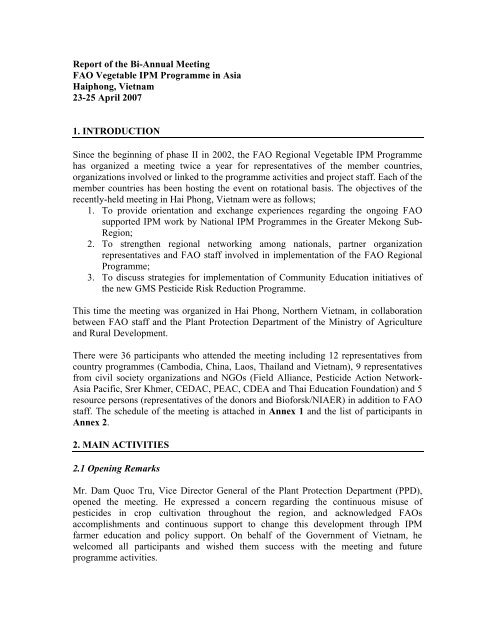
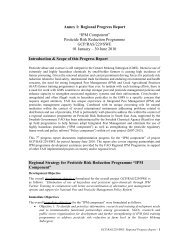
![Section 4 [ PDF file, 252 KB] - The Field Alliance](https://img.yumpu.com/51387260/1/158x260/section-4-pdf-file-252-kb-the-field-alliance.jpg?quality=85)
